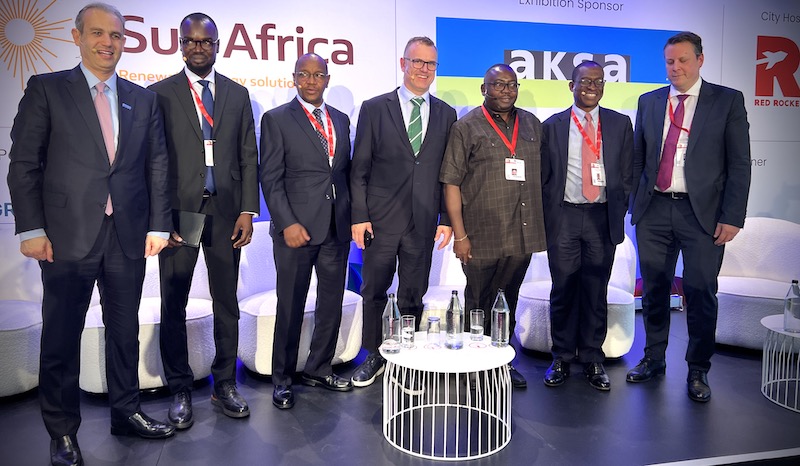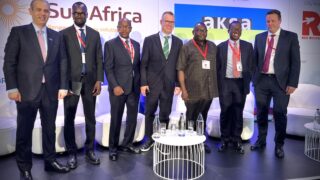Leading SA renewable projects enjoy a global spotlight
Cape Town, 19 June 2025: “I have been attending these events for thirteen years and it’s time for us to change. In the coming years, my great hope is that 90% of the investors here will be African. I don’t believe those from afar can tell us what to do. That’s how we will change things here, and overcome the current wall of resistance.”
These were the words of Seriti Green CEO, Peter Venn, one of the key speakers presenting on Wednesday at the Africa Energy Forum (AEF), in Cape Town for the first time in its 27-year history. Running from 18–21 June 2025 at the Cape Town International Convention Centre (CTICC), AEF 2025 has convened more than 6,000 energy professionals, ministers, utility leaders, developers, investors and youth delegates, all gathered to address one of the continent’s most pressing questions: how to scale energy access and transition to low-carbon systems while driving economic inclusion.
Positioned ahead of South Africa’s upcoming G20 meeting in Mpumalanga in September, the forum holds symbolic and strategic value. More than 25 energy ministers and 30 heads of utilities are attending, alongside African Development Bank officials, global financiers, power producers, and technology companies. The event, now in its second year co-located with the Youth Energy Summit (YES!), with over 5000 young Capetonians attending, is not only a hub for infrastructure investment, but also a platform for shaping a continental voice on energy equity and resilience.
Sessions this year range from regional power pools and battery storage to wheeling policy and digital infrastructure. The stakes are high. According to the International Energy Agency (IEA), Africa needs more than US$190 billion per year in energy investments by 2030, two-thirds of which must be directed toward clean energy. The forum aims to close that gap—not only through deals, but through shared accountability.
Seriti Green’s project in Mpumalanga is the largest infrastructure in the province, gaining attention for its integration of large-scale renewables with social and economic transition.
Venn delivered a clear caution: “We know electricity supply needs to double in the next 20 years. Without buy-in and real government support, it becomes impossible.” He went on to challenge the notion that decarbonisation must come at the expense of jobs, stating that more than 50% of the skills needed for renewables already exist in South Africa’s coal sector.
Seriti Green’s current wind project, Ummbila Emoyeni, a 900MW facility with 800MWh of battery storage, has reached financial close and begun infrastructure development.
The full programme anticipates R70 billion in investment by 2030. According to Venn, 1,187 people are already working on-site as of mid-June, with a 10-year local employment programme underway and 16,000 people registered on the Seriti Green jobs portal.
Beyond direct employment, the portal is also integrating local vendors to bid for tenders such as fencing, catering, and waste removal, offering training and compliance assistance. The project is reusing water from its mining operations, investing R50 million in port upgrades at Richards Bay, and gifting a new weather radar to support environmental monitoring.
“This is not just about electrons. It’s about ecosystems,” Venn said. “We have to get the communities to come along. The energy transition is technically simple. Socially, it’s the hardest part.”
Elsewhere at AEF, voices from across the continent echoed similar concerns. Delegates from Nigeria, Senegal, the African Development Bank, and Siemens Energy highlighted the gaps in transmission infrastructure, project bankability, and regulatory readiness. Discussions focused not just on megawatts, but on mechanisms – how to de-risk investments, scale regional integration, and support homegrown innovation.
The Youth Energy Summit running in parallel brought in over several thousand young professionals and students, representing a growing focus on generational renewal in the sector. Panel discussions included youth financing models, gender equity in the energy workforce, and the rise of local tech innovation hubs in energy services.
AEF’s arrival in Cape Town was seen by many as overdue. South Africa is home to both legacy coal dependency and one of the continent’s most advanced renewable procurement frameworks. Yet its transition remains fraught with grid constraints, labour dynamics, and political complexity.
Peter Venn’s remarks captured that tension while pointing to possibility. “There is a fallacy that all jobs are lost,” he said. “We are seeing the transition unfold in front of us, and it is possible to grow both dignity and capacity if we are intentional.”
In the final two days, AEF will continue with closed-door investment roundtables, regional power briefings, and ministerial panels. While few expect consensus on every point, the tone this year has been clear: African solutions must lead the African energy transition. And that leadership must now be visible, verifiable, and just.
Sources:
• Africa Energy Forum Official Website: https://www.africa-energy-forum.com
• International Energy Agency (IEA) Africa Energy Outlook 2022: https://www.iea.org/reports/africa-energy-outlook-2022
• African Development Bank – Just Energy Transition: https://www.afdb.org/en/topics-and-sectors/initiatives-partnerships/just-transition-initiative
• YES! Youth Energy Summit: https://www.africa-energy-forum.com/youth-energy-summit
Brandstories Disclaimer:
Brandstories is not liable for the contents of the information published on this platform. The information which subscribers publish on this website is for general information purposes only and Brandstories facilitates the ability for viewers and subscribers to access this platform. Subscribers who publish their content on Brandstories are held responsible for their own content. This includes ensuring that it is factually accurate, grammatically correct, free of spelling errors, and does not contain unsavoury content that could result in legal action. In the case of linguistic translations, the onus is on the client to ensure that the translation is accurate. In no event does Brandstories make representations or warranties of any kind, expressed or implied about the completeness, accuracy, reliability, suitability or availability with respect to the information supplied and published. This website includes links to other websites, including third party websites. Brandstories does not recommend, endorse or support any views that are held by subscribers publishing information, and within these links provided. Furthermore, Brandstories does not have control over the nature, contents and availability of information contained on these sites. Any form of reliance readers and consumers may place on information published on Brandstories is strictly at their own risk. Brandstories makes every effort to ensure that the website is up and running smoothly at all times, however Brandstories does not take responsibility for, and will not be held liable for times when the website is temporarily unavailable due to technical glitches that are beyond our control.
You may also like
-
SLAM Acquires 51% Stake in Academia – Stellenbosch’s Flagship Student Residence
-
32-year-old energy CFO inspires rising stars at Youth Energy Summit 2025
-
South Africa becomes global BPO contender
-
Can Business Save the World? Africa’s Role in a Time of Crisis
-
Paving the way for low-cost renewable energy in Kenya


